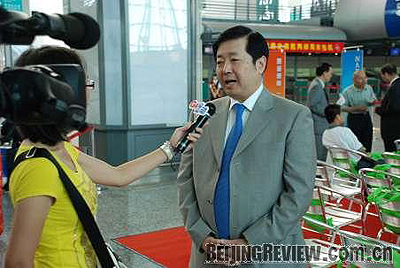|
|
READY FOR MISSION: China sends warships to protect its vessels from pirate attacks off Somalia’s coast. The file photo shows the two Chinese destroyers, Wuhan and Haikou, due to set sail for Somali waters on December 26 (CFP) | Piracy, armed robbery, political turmoil and terrorism. These are some of the unprecedented risks threatening Chinese citizens abroad. Protecting their safety has become one of the priorities on the Chinese Government's diplomatic agenda. At the end of 2008, Beijing Review reporter Yan Wei spoke to Wei Wei, Director General of the Department of Consular Affairs in China's Foreign Ministry, about the security situation facing overseas Chinese citizens, the consular protection offered by the Foreign Ministry and how the ministry dealt with major incidents in 2008. Excerpts follow:
Beijing Review: The Chinese Govern-ment sent warships to the waters off Somalia to protect Chinese vessels given that piracy there has become an international problem and a number of Chinese vessels or ships carrying Chinese crew or cargo have been hijacked. What role does the Foreign Ministry play in dealing with these ship seizures?
Wei Wei: Piracy has been rampant off Somalia's coast and in the Gulf of Aden for years, posing a severe threat to international navigation and maritime trade and security. There were seven hijackings involving China in 2008. Today, pirates still hold one Chinese fishing boat and 17 crewmembers.
|

Wei Wei, Director General of the Department of Consular Affairs in China’s Foreign Ministry (FOREIGN MINI STRY) | The Foreign Ministry puts its emergency reaction mechanism to work immediately after an incident happens. It contacts foreign governments and institutions to verify information, orders its missions in foreign countries such as the Embassy in Kenya to initiate rescue efforts as soon as possible and tries to ensure the safety of the hijacked ships and crewmembers. For example, our intensive efforts led to the release of the 24 crewmembers on a Hong Kong cargo ship two months after it was hijacked off Somalia's coast in September 2008. The consular general in Dubai visited them on behalf of the Chinese Government.
The UN Security Council has adopted several resolutions authorizing countries to take anti-piracy actions off Somalia's coast. The Somali Transitional Federal Government has also called on other countries to fight pirates in its territorial sea. A Chinese naval fleet consisting of two destroyers and one supply ship set out for Somali waters from Sanya in south China's Hainan Province on December 26. Their mission is to protect Chinese ships and crew as well as ships carrying humanitarian relief material for international organizations including the World Food Program. Chinese naval vessels will observe UN Security Council resolutions and international law while carrying out their escort mission. They are also ready to work with convoy warships of other countries and take part in humanitarian relief tasks when necessary.
During the political turmoil in Thailand, the Chinese Government dispatched planes to bring Chinese citizens stranded in Bangkok back home. Can you give us some details about the case to show how the Foreign Ministry works in time of crisis?
The Thai authorities closed Suvarnabhumi Airport after the anti-government People's Alliance for Democracy staged large protests in Bangkok on the evening of November 25. As all flights were cancelled, tens of thousands of foreign travelers, including several thousand Chinese, were unable to leave.
Based on reports from the Chinese Embassy in Thailand, the State Council-China's Cabinet-charged the Foreign Ministry with handling the incident quickly in collaboration with other agencies. At 4:30 p.m. on November 28, the Foreign Ministry convened an inter-ministerial meeting with representatives from the Civil Aviation Administration of China (CAAC), the National Tourism Administration and the Ministry of Finance and decided to send commercial airliners to pick up trapped Chinese citizens. The Consular Protection Center at the Foreign Ministry set up a working group that worked around the clock. The center also asked the embassies in Laos, Viet Nam and Thailand to help obtain flying and landing licenses from the governments of these countries for the Chinese flights.
The first five planes sent on November 29 proved to be far from enough. Under the coordination of the Foreign Ministry, the CAAC, the National Tourism Administration and the Chinese Embassy in Thailand all tried to independently figure out the exact number of trapped Chinese citizens, what tickets they had and their destinations in China. After putting together information from different sources, the Foreign Ministry finalized an efficient flight arrangement with the CAAC. They also guided airlines in adopting flexible and favorable ticket policies so that stranded Chinese citizens could go through boarding procedures as quickly as possible.
|
